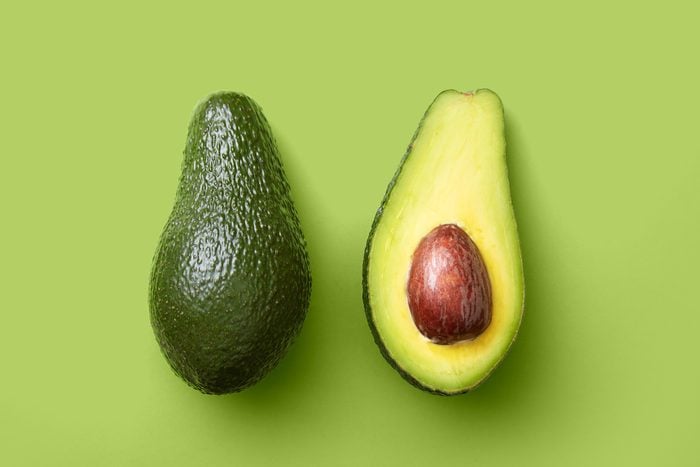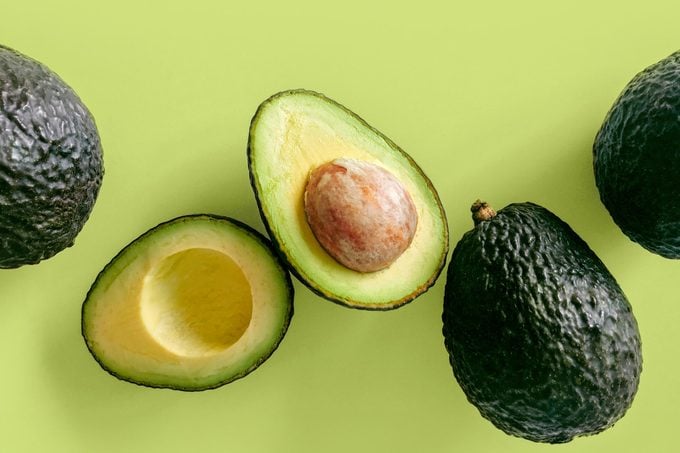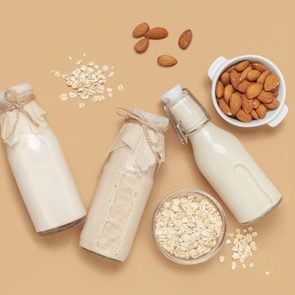If You Don’t Eat an Avocado a Day, This Might Convince You to Start
Updated: Oct. 05, 2023

Are avocados good for you? Let's just say you never need to shy away from enjoying this trendy and delicious food.
Ours is a country of avocado lovers. Who says no to a scoop of guacamole or orders a salad—hold the diced green fruit? Personally, I can’t think of a single instance in which someone turned down the of-the-moment avocado. Our obsession hinges on these two facts: Are avocados delicious? Yes. Are avocados good for you? Absolutely.
“The hype around avocados is not overblown,” says Jordan Brown, RDN, the director of nutrition sciences at Ayble Health, a digital gastroenterology care platform. “They really are a fantastic food.”
With that dietitian seal of approval in mind, we’re diving in to all the fascinating food facts about avocados and the health perks you can get from making them a staple in your diet. (Get this: They are on par with the benefits of eating blueberries and bananas every day). Read on for the nutrition news you need, straight from nutrition experts.
Get Reader’s Digest’s Read Up newsletter for more food news, humor, cleaning, travel, tech and fun facts all week long.
So, is avocado good for you?
“Avocados are a powerhouse food, complete with healthy fats, fiber, lots of vitamins, minerals and anti-inflammatory compounds,” says Brown. Indeed, there’s almost nothing bad about the fruit (yep, avocado is a fruit)—it’s filling, satisfying and versatile, making it a no-brainer for incorporating into your daily diet.
The benefits of avocados
Just how good for you is this fruit? The term “superfood” gets tossed around a lot, but avocados truly fit the bill. The five avocado benefits below explain why these little green goodies belong in your diet.
They keep you full and satisfied
You have the healthy fat—specifically, monounsaturated fat—and fiber in avocado to thank for that wonderfully satisfied feeling you get after eating the fruit. One medium avocado has about 15 grams of monounsaturated fat and 10 grams of fiber, a powerful combination of nutrients that will make you feel satiated sooner and keep you full for longer.
The fat and fiber are also two of the reasons eating avocado can help you lose weight. In a study published in Nutrition Journal, researchers found that people who ate avocados regularly had significantly lower body weight, BMI and waist circumference than those who didn’t partake. The fact that they ate a larger variety of healthy foods overall may mean that the sort of people who chow down on avocados also tend to follow a diet that keeps them trim. But it could also indicate that eating avocados will help you kiss your belly fat goodbye.
They’re loaded with nutrients
Are avocados good for you just because of the fat and fiber? Not by a long shot. “Avocados are a great source of vitamins and minerals such as folate, magnesium, potassium and vitamins C, E, B and K,” notes Brown. That guarantees perks like healthy blood cells, powerful muscles, high energy levels and strong bones.
“They are also high in lutein, which has been linked to improved brain health, cognitive function and healthy eye function,” she adds. That’s the nutrient famously found in eggs and the reason your morning poached eggs are so good for your vision.
“They’re also very high in antioxidants and other anti-inflammatory nutrients,” Brown says. And those help power up your immune system.
They’re heart healthy
Despite the advice some of us grew up with about avoiding high-fat foods to protect our tickers, we know now that healthy fats are good for the heart. (It’s why an improvement in heart health is one of the surprising benefits of a keto diet.) And as healthy, high-fat foods go, avocados are at the top of the list. “They can help lower cholesterol, reduce inflammation and reduce your risk of heart disease or stroke,” Brown says.
Indeed, a 2022 study from the American Heart Association found that higher avocado intake was associated with a lower risk of cardiovascular disease (CVD) and coronary heart disease in over 100,000 people. More specifically, people who ate avocado at least three times per week had a 16% lower risk of CVD and a 21% lower risk of coronary heart disease. Replacing just half a serving per day of margarine, butter, egg, yogurt, cheese or processed meats with the equivalent amount of avocado was associated with a 16% to 22% lower risk of CVD.
You can sneak them into recipes
“The creamy, bland taste of avocado can be mixed with almost anything and makes a great dip and spread,” says Amy Lee, MD, head of nutrition for supplement company Nucific. You can blend avocado into smoothies; use it as a base for a salsa, dressing or dip; pile slices on a burger or sandwich; and dice it over a salad or some protein-packed cottage cheese. You can even use it to make pudding or fudge.
They might improve your sleep
“Eating avocado at night may even help you sleep better because of the magnesium and potassium, two minerals associated with better sleep,” says Brown.
That’s right: Research shows that magnesium has a relaxing effect, which is why people frequently take magnesium supplements to help them sleep. And studies suggest potassium can improve sleep quality. You can get both from an avocado.
Is it OK to eat avocado every day?

We know that they are healthy, but are avocados good for you to the point that you can eat one every day? “Yes, it is OK to eat avocado daily,” affirms Dr. Lee.
The American Heart Association agrees. In a recent study published in the Journal of the American Heart Association, researchers asked 500 overweight people to eat one large avocado every day for six months and another 500 participants to pass on the fruit. By the end of the study, the avocado group had lost slightly more visceral fat (the dangerous type of fat around your organs) and had larger reductions in total cholesterol and LDL (bad) cholesterol levels.
Too much of a good thing
All this begs the question: Is there a downside to eating avocado every day? Can you ever get too much of this good-for-you food?
“The amount you should eat really depends on what else you are eating,” says Dr. Lee. “Avocado is higher in fat—good fat, to be exact—compared with all fruits, which can translate to more calories, so it’s important to be aware of how much you’re eating for caloric purposes.”
In other words, if you’re counting calories, make sure you’re aware of how much of your daily allowance your avocado habit is consuming.
A varied diet is a healthy diet
Likewise, try not to eat so much avocado that it’s taking the place of other healthy produce. “The only thing to watch out for is if you’re eating so much avocado that you’re crowding out other healthy fruits and veggies,” says Brown. “If so, back off a little and bring some more variety in.”
You can also look for ways to add other fruits or vegetables to your avocado-centric favorite. Try topping avocado toast with roasted cherry tomatoes or pickled onions, for instance.
Listen to your gut
The only caveat to our experts’ pro-avocado stance? “Some people with irritable bowel syndrome (IBS), SIBO [small intestinal bacterial overgrowth] or other digestive issues need to be a little cautious with how much avocado they eat because they are relatively high in FODMAPs,” Brown says. “FODMAPs are types of carbohydrates that are poorly digested by people with IBS. But that should not be taken as a rule. Everyone is unique, and plenty of people with digestive issues are absolutely fine with avocados.”
Is guacamole good for you?
If you find avocado on its own to be a bit bland—which it can be, especially if you’re unsure how to ripen avocados for maximum flavor—but you love guacamole, feel free to slather it on everything. A traditional guacamole typically adds ingredients like onions, jalapeños or other peppers, tomatoes, lime juice and salt to the avocado, all of which are part of a healthy and varied diet.
Guacamole is also a great vessel for experimenting. Next time you’re entertaining (or just hungry on a weeknight), consider adding diced mango or grilled pineapple to your guacamole.
Is there a right way to eat avocado for maximum benefits?
“Like many healthy fruits and veggies, avocados work best in synergy with other foods,” says Brown. “They help your body absorb fat-soluble vitamins like A, D, E and K. So eating avocado with a salad or any other veggies actually helps you to absorb the vitamins from those foods.”
Sticking with the idea of maintaining a diverse and varied diet, it’s smart to pair avocado with nutrients it doesn’t have, such as protein or complex carbs. “Because the avocado is high in fat and fiber, you may not want to eat it with another high-fat and fiber food,” notes Dr. Lee. Fruits, vegetables and whole grains are your best bet in maximizing the health benefits of avocados. And, of course, you want to keep avocados fresh in order to get the most perks.
Are avocados good for you to the point that you can also eat them on their own? For sure. It just can’t hurt to load your plate with other healthy and yummy foods in the process.
About the experts
- Jordan Brown, MS, RDN, LDN, is a registered and licensed dietitian and nutritionist and the director of nutrition sciences at Ayble Health, a digital gastroenterology care platform. Her input was compiled with support from Carol Woloszyn, NBC-HWC, and Stefania Patinella, MA, NBC-HWC, board-certified health and wellness coaches who also work with Ayble Health.
- Amy Lee, MD, is the head of nutrition for Nucific, a supplement company focused on digestive health, weight management and energy improvement. She is a board-certified internal medicine physician and a member of the National Board of Physician Nutrition Specialists and the American Board of Obesity Medicine.
Sources:
- Harvard T.H. Chan School of Public Health: “Avocados”
- Nutrition Journal: “Avocado consumption is associated with better diet quality and nutrient intake, and lower metabolic syndrome risk in US adults”
- Journal of the American Heart Association: “Avocado Consumption and Risk of Cardiovascular Disease in US Adults”
- Journal of the American Heart Association: “Effect of Incorporating 1 Avocado Per Day Versus Habitual Diet on Visceral Adiposity: A Randomized Trial”



